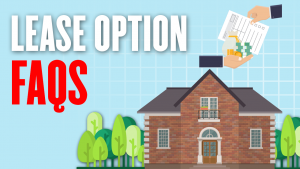For many individuals, the decision between renting or buying a home can be quite overwhelming. While purchasing a house comes with various benefits, the challenge of saving for a down payment and managing monthly expenses may make homeownership feel like an unattainable dream.
However, there is an alternative that provides additional flexibility when weighing the buy-versus-rent dilemma: a lease option. In this article, we will explore the concept of a lease option, its mechanics, and the crucial aspects to consider when determining if it aligns with your needs.
What Is Are Lease Options?

A lease option, or lease with option to buy, is a real estate contract that offers a property renter the opportunity to purchase the property after the lease period concludes. The contract entails an upfront option fee paid by the renter for the potential to buy the property, along with a monthly fee contributing to the down payment if the renter chooses to exercise the buying option.
During the lease term, the property owner is restricted from selling the property to anyone other than the tenant. If the renter decides not to buy the property at the lease’s end, they forfeit the option fee and any down payment funds already paid.
Lease Option Vs. Lease Purchase Agreement
Distinguishing a lease option from a lease purchase agreement is essential in real estate contracts. In a lease purchase agreement, both buyer and seller are bound to the property’s sale after the lease term. On the other hand, with a lease option, the renter is not obligated to proceed with purchasing the property.
What’s Required For Lease Options?
A comprehensive lease option contract should cover the following essential details:
- Lease term: Clearly state the duration of the renter’s occupancy before they can exercise the option to buy.
- Option fee: The contract must include the agreed-upon fee paid to the property owner for the opportunity to purchase the property.
- Purchase price: Whether the renter buys the property or not, the contract must specify the purchase price.
- Rental amount: Both parties should agree on the monthly rent amount for the lease duration.
- Rent credit: Outline the portion of the monthly rent that will be credited towards the future down payment.
- Mandated homeowners insurance: While not obligatory, it’s advisable for renters to ensure that the property owner maintains homeowners insurance throughout the lease term to safeguard the property’s value in case of unforeseen events.
Lease With Option To Buy: How It Works

Let’s delve into the step-by-step process of lease options:
- Contract Signing: The lease option commences with an agreement between the tenant and the landlord or real estate investor. Key aspects, such as lease duration and the home’s sales price (typically the market value at the lease signing), must be mutually agreed upon.
- Option Fee Payment: After signing the contract, the renter, now a potential buyer, must pay the option fee, usually ranging from 2% to 7% of the total purchase price.
- Rent Payment: During the lease period, the renter pays above-market rent for residing in the property. Additionally, they make an extra monthly premium (referred to as a rental credit), which contributes towards their down payment should they proceed with the purchase at the lease end.
- Buy or Forfeit Decision: At the lease term’s conclusion, the renter has the choice to buy the property or walk away. Opting out means forfeiting the money put towards the option fee and the additional monthly payments. However, there are no further repercussions, and the property’s owner can then choose to rent or sell the home as they see fit.
Why Might A Lease Option Make Sense?
Certainly, apart from the potential advantages of a lease option, there are additional aspects to consider before confidently determining if it suits your needs.
For Potential Buyers: The primary risk for buyers opting for a lease option is the absence of guaranteed mortgage approval. If one is denied a mortgage loan when the lease term concludes, they must forfeit the purchase option. Hence, it may not be advisable to choose a lease option if unsure about qualifying for a mortgage.
For Property Owners: Lease options might not be a suitable choice for property owners seeking a guaranteed sale. Since there is no assurance that the renter will proceed with the purchase, it might not be the best option for property owners needing to sell the property.
Another risk for sellers entering a lease option agreement is the potential sale of the home below market value. Irrespective of any increase in the property’s value during the lease, the seller is obligated to sell at the price specified in the contract.
Lease Option FAQs

Interested in lease options? Here are answers to some common queries:
- Who writes a lease option contract? A real estate attorney is best suited for crafting a lease option contract, considering the complexities and financial commitments involved. They can offer guidance on any uncertainties you might have.
- Where to find homes with a lease-to-buy option? Reach out to a real estate agent or REALTOR® to discover lease option homes in your vicinity. Alternatively, some brokerages may offer dedicated lease-to-own programs. Directly contacting sellers is also an option.
- Can I exit a lease option agreement? As a renter, you are not bound to purchase the property, so you can simply walk away when the lease term ends. However, sellers are legally obliged to honor the contract, and there may be legal consequences for backing out.
MORE Lease Options blogs HERE:
Mastering Lease Options: Your Ultimate Guide
Profiting from Lease Options: A Guide
Tax Implications of Lease Options
Lease Options or Traditional Rentals: Which Offers Greater Advantage?
Lease Options for Long-term Investing
How to Use Lease Options to Invest in Real Estate
Understanding Lease Options to Buy
What Is a Buyout Option On a Lease
What Is A ‘Short Lease’ in London?
How To Find Purchase Lease Option Properties
